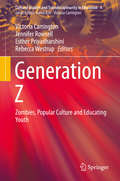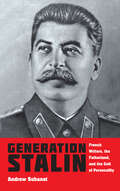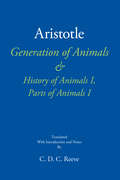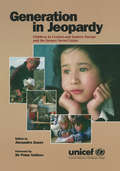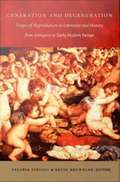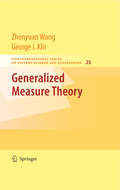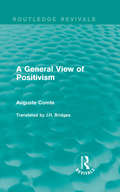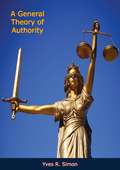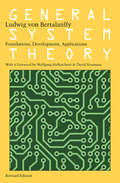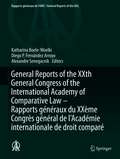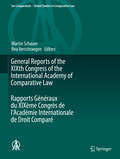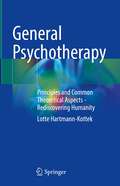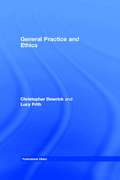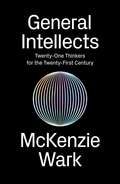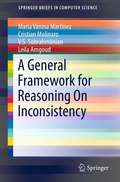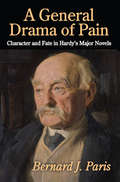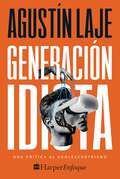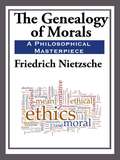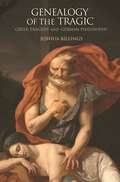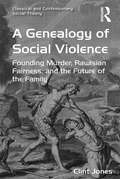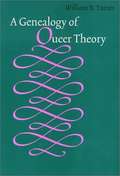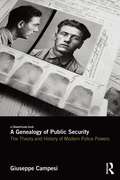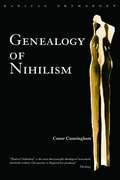- Table View
- List View
Generation Z
by Rebecca Westrup Esther Priyadharshini Jennifer Rowsell Victoria CarringtonThis book argues that the mythic figure of the zombie, so prevalent and powerful in contemporary culture, provides the opportunity to explore certain social models - such as 'childhood' and 'school', 'class' and 'family' - that so deeply underpin educational policy and practice as to be rendered invisible. It brings together authors from a range of disciplines to use contemporary zombie typologies - slave, undead, contagion - to examine the responsiveness of everyday practices of schooling such as literacy, curriculum and pedagogy to the new contexts in which children and young people develop their identities, attitudes to learning, and engage with the many publics that make up their everyday worlds.
Generation Stalin: French Writers, the Fatherland, and the Cult of Personality
by Andrew SobanetA look at how four French writers of the 1930s, ‘40s, and ‘50s contributed to the rise of Stalin in their country and abroad.Generation Stalin traces Joseph Stalin’s rise as a dominant figure in French political culture from the 1930s through the 1950s. Andrew Sobanet brings to light the crucial role French writers played in building Stalin’s cult of personality and in disseminating Stalinist propaganda in the international Communist sphere, including within the USSR. Based on a wide array of sources—literary, cinematic, historical, and archival—Generation Stalin situates in a broad cultural context the work of the most prominent intellectuals affiliated with the French Communist Party, including Goncourt winner Henri Barbusse, Nobel laureate Romain Rolland, renowned poet Paul Eluard, and canonical literary figure Louis Aragon. Generation Stalin arrives at a pivotal moment, with the Stalin cult and elements of Stalinist ideology resurgent in twenty-first-century Russia and authoritarianism on the rise around the world.“This is an outstanding work of intellectual history. . . . Highly recommended.” —Choice“A landmark study, brilliantly written, containing exemplary scholarship. Sobanet establishes himself with this volume as one of the foremost interpreters of French intellectual life. He brings to his study a cornucopia of historical knowledge and the finesse of a first-class literary critic.” —Lawrence D. Kritzman, editor of The Columbia History of Twentieth-Century French Thought“This is an ambitious project that is well executed, with a readership that is potentially far reaching—with implications for Russian/Stalin studies, French studies, including politics and society, as well as propaganda writing and the role of the media more generally. . . . Generation Stalin is a very timely book.” —Denis M. Provencher, author of Queer French: Globalization, Language, and Sexual Citizenship in France“Sobanet’s study of “Generation Stalin” and the four writers he associates with the group, Henri Barbusse, Romain Rolland, Paul Eluard, and Louis Aragon, is, quite simply, magisterial. Written in lucid prose informed by meticulous and wide-ranging scholarship including archival material, books, essays, press items, and other relevant documents, the book provides an in-depth study of the rise of the Stalin cult in France.” —Carol J. Murphy, author of The Allegorical Impulse in the Works of Julien Gracq: History as Rhetorical Enactment in “Le Rivage des Syrtes” and “Un Balcon en forêt”
Generation of Animals & History of Animals I, Parts of Animals I (The New Hackett Aristotle)
by AristotleThis edition includes new translations of Aristotle's Generation of Animals along with History of Animals I and Parts of Animals I. The translations are noteworthy for their consistency and accuracy, and fit seamlessly with the other volumes in the series, enabling Anglophone readers to read Aristotle's works in a way previously not possible. Sequentially numbered endnotes provide the information most needed at each juncture, while a detailed Index of Terms guides the reader to places where focused discussion of key notions occurs.
Generation in Jeopardy: Children at Risk in Eastern Europe and the Former Soviet Union
by Unicef Alexander ZouevThis disturbing volume probes beneath the rhetoric about system change in the transition societies of Central and Eastern Europe and the former Soviet Union to examine the impact of political, social, and economic dislocation, ethnic conflict and civil war on the most population: children.
Generation and Degeneration: Tropes of Reproduction in Literature and History from Antiquity Through Early Modern Europe
by Valeria Finucci Kevin BrownleeThis distinctive collection explores the construction of genealogies--in both the biological sense of procreation and the metaphorical sense of heritage and cultural patrimony. Focusing specifically on the discourses that inform such genealogies, Generation and Degeneration moves from Greco-Roman times to the recent past to retrace generational fantasies and discords in a variety of related contexts, from the medical to the theological, and from the literary to the historical. The discourses on reproduction, biology, degeneration, legacy, and lineage that this book broaches not only bring to the forefront concepts of sexual identity and gender politics but also show how they were culturally constructed and reconstructed through the centuries by medicine, philosophy, the visual arts, law, religion, and literature. The contributors reflect on a wide range of topics--from what makes men "manly" to the identity of Christ's father, from what kinds of erotic practices went on among women in sixteenth-century seraglios to how men's hemorrhoids can be variously labeled. Essays scrutinize stories of menstruating males and early writings on the presumed inferiority of female bodily functions. Others investigate a psychomorphology of the clitoris that challenges Freud's account of lesbianism as an infantile stage of sexual development and such topics as the geographical origins of medicine and the materialization of genealogy in the presence of Renaissance theatrical ghosts. This collection will engage those in English, comparative, Italian, Spanish, and French studies, as well as in history, history of medicine, and ancient and early modern religious studies. Contributors. Kevin Brownlee, Marina Scordilis Brownlee, Elizabeth Clark, Valeria Finucci, Dale Martin, Gianna Pomata, Maureen Quilligan, Nancy Siraisi, Peter Stallybrass,Valerie Traub
Generalized Measure Theory
by Zhenyuan Wang George J. KlirGeneralized Measure Theory examines the relatively new mathematical area of generalized measure theory. The exposition unfolds systematically, beginning with preliminaries and new concepts, followed by a detailed treatment of important new results regarding various types of nonadditive measures and the associated integration theory. The latter involves several types of integrals: Sugeno integrals, Choquet integrals, pan-integrals, and lower and upper integrals. All of the topics are motivated by numerous examples, culminating in a final chapter on applications of generalized measure theory. Some key features of the book include: many exercises at the end of each chapter along with relevant historical and bibliographical notes, an extensive bibliography, and name and subject indices. The work is suitable for a classroom setting at the graduate level in courses or seminars in applied mathematics, computer science, engineering, and some areas of science. A sound background in mathematical analysis is required. Since the book contains many original results by the authors, it will also appeal to researchers working in the emerging area of generalized measure theory.
General Will 2.0
by John Person Hiroki AzumaAccording to Azuma, the collective will and the general social contract has changed the world's political landscape over the last couple of years. Azuma looks back at Rousseau and Freud then forward to Twitter and Google to express how man deals with their part of the collective will through time. Azuma challenges society's perceptions of general will by looking at three philosophies through both time and technology. Azuma's unique analysis can be as compelling as fiction while making readers feel enlightened in the process.
The General Will
by James Farr David Lay WilliamsAlthough it originated in theological debates, the general will ultimately became one of the most celebrated and denigrated concepts emerging from early modern political thought. Jean-Jacques Rousseau made it the central element of his political theory, and it took on a life of its own during the French Revolution, before being subjected to generations of embrace or opprobrium. James Farr and David Lay Williams have collected for the first time a set of essays that track the evolving history of the general will from its origins to recent times. The General Will: The Evolution of a Concept discusses the general will's theological, political, formal, and substantive dimensions with a careful eye toward the concept's virtues and limitations as understood by its expositors and critics, among them Arnauld, Pascal, Malebranche, Leibniz, Locke, Spinoza, Montesquieu, Kant, Constant, Tocqueville, Adam Smith, and John Rawls.
A General View of Positivism: Large Print (Routledge Revivals)
by Auguste ComteIn Comte’s original work on positivism, he attempted to outline a general perception of positivism, how it can be applied to society and how society would work should positivism be applied. J.H. Bridges’ translation, originally published in 1865, this version first published in 1908, manages to simplify and clarify Comte’s views of positivism and how it is related to the thoughts, feelings and actions of humankind as well as how positivism can be applied to philosophy, politics, industry, poetry, the family and the future. This title will be of interest to students of sociology and philosophy.
A General Theory of Authority
by Yves R. SimonA General Theory of Authority was first printed in 1962 and is a classic treatment of authority and its relation to justice, life, truth, and order. In recent years authority has been seen as an enemy of freedom, autonomy, and development. In this book the renowned philosopher Yves R. Simon, himself a passionate proponent of liberty, analyzes the idea of authority and defends it as an essential concomitant of liberty. Simon sees authority as the catalyst necessary to bring together the seemingly disparate demands of liberty on one hand and order on the other.Simon’s perceptive discussion of how authority differs from law enables him to highlight the effective and personal role that authority can play in the life of the individual and for the good of the community.Professor Yves R. Simon was an esteemed philosopher and teacher at several American universities, including Notre Dame and the University of Chicago. He published numerous books and articles, many of which remain as classic pieces of political and social philosophy. Professor Simon died in 1961.
General System Theory: Foundations, Development, Applications
by David Rousseau Ludwig Von Bertalanffy Wolfgang HofkirchnerThe classic book on a major modern theory Bertalanffy's selected writings on his theory of laws applicable to virtually every scientific field. This conceptual approach has had a profound impact on biology, economics, psychology, and demography, with new relevancies today. The new foreword by University of Vienna system theory professor, Wolfgang Hofkirchner, and Centre for Systems Philosophy director, David Rousseau, discusses the theory's contemporary applications.
General Reports of the XXth General Congress of the International Academy of Comparative Law - Rapports généraux du XXème Congrès général de l'Académie internationale de droit comparé (Ius Comparatum - Global Studies in Comparative Law #50)
by Katharina Boele-Woelki Diego P. Fernández Arroyo Alexandre SenegacnikThis book explores convergences of legal doctrine despite jurisdictional, cultural and political barriers, as well as divergences due to such barriers, examining topics that are of vital importance to contemporary legal scholars. Written by leading experts from all continents, its 26 chapters present a comparative analysis of cutting-edge legal issues of the 21st century. While each of the countries covered stands alone as a sovereign state, in a technologically advanced world their disparate systems nonetheless show comparable strategies in dealing with complex legal issues. Several of the chapters show how, in addition to state normative production and state adjudication, a growing panoply of non-state instruments and non-state adjudication are becoming more and more central to the legal field. This book is a key addition to the library of any scholar wanting to keep abreast of the major trends in contemporary law. Representing the current state of law in a vast range of areas, it covers each topic from a comparative perspective. Cet ouvrage, en examinant des sujets d'une importance vitale pour les juristes contemporains, traite des convergences de la doctrine juridique malgré les barrières juridictionnelles, culturelles et politiques ainsi que des divergences dues à ces barrières. Écrits par d'éminents universitaires de tous les continents, ses 26 chapitres présentent une analyse comparative de sujets juridiques majeurs du 21e siècle. Dans un monde technologiquement avancé, bien que chaque pays analysé dans cet ouvrage demeure autonome en tant qu'État souverain, l’ensemble des systèmes disparates présente néanmoins des stratégies comparables pour traiter des questions juridiques complexes. En outre, plusieurs chapitres montrent comment, en plus de la production normative et de la résolution des différends étatiques, la panoplie croissante de différents types d'instruments non étatiques et de résolution non étatique des différends devient de plus en plus centrale dans la sphère juridique. Cet ouvrage est un ajout essentiel à la bibliothèque de tout universitaire souhaitant se tenir au courant des principales tendances du droit contemporain. Il couvre un vaste domaine de sujets traités d'un point de vue comparatif et représente l'état actuel du droit dans chaque domaine.
General Reports of the XIXth Congress of the International Academy of Comparative Law Rapports Généraux du XIXème Congrès de l'Académie Internationale de Droit Comparé
by Martin Schauer Bea VerschraegenThis book deals with convergences of legal doctrine despite jurisdictional, cultural, and political barriers, and of divergences due to such barriers, examining topics that are of vital importance to contemporary legal scholars. Written by leading scholars from more than twenty countries, its thirty-two chapters present a comparative analysis of cutting-edge legal topics of the 21st century. While each of the countries covered stands alone as a sovereign state, in a technologically advanced world their disparate systems nonetheless show comparable strategies in dealing with complex legal issues. The book is a critical addition to the library of any scholar hoping to keep abreast of the major trends in contemporary law. It covers a vast area of topics that are dealt with from a comparative point of view and represents the current state of law in each area.
General Psychotherapy: Principles and Common Theoretical Aspects - Rediscovering Humanity
by Lotte Hartmann-KottekThis book highlights common similarities between the various schools of psychotherapy. It provides psychotherapists with the underlying neurophysiological, developmental psychological and relationship-oriented matrix (basic needs and their regulation, deficits, trauma and conflict processing patterns, including accompanying exercises) as well as opportunities for healing correction and stabilisation - and the ways in which to apply these methods in a therapeutically mindful way for the benefit of the patient. The new university-based psychotherapy training covers the four fundamental schools of psychotherapy, i.e. the previous standard approaches plus the systemic and humanistic ones. Focusing on the common ground builds bridges of understanding and encourages collaboration. This expanded, new range of methods to access patients constitutes a substantial development in the field of psychotherapy and will also influence the psychotherapy practice of experienced colleagues. Written for medical and psychological psychotherapists, psychosomatic doctors, psychiatrists and other specialists with additional psychotherapeutic qualifications, and for students of psychotherapy.
General Practice and Ethics (Professional Ethics)
by Christopher Dowrick Lucy FrithExplores the ethical issues faced by GPs in their everyday practice, addressing two central themes; the uncertainty of outcomes and effectiveness in general practice and the changing pattern of general practitioners' responsibilities.
General Intellects: Twenty-Five Thinkers for the Twenty-First Century
by Mckenzie WarkA guide to the thinkers and the ideas that will shape the futureWhat happened to the public intellectuals that used to challenge and inform us? Who is the Sartre or De Beauvoir of the internet age? General Intellects argues that we no longer have such singular figures, but we do have general intellects whose writing could, if read together, explain our times. Covering topics such as culture, politics, work, technology, and the Anthropocene, each chapter is a concise account of an individual thinker, providing useful context and connections to the work of the others. McKenzie Wark’s distinctive readings are appreciations, but are also critical of how neoliberal universities militate against cooperative intellectual work to understand and change the world. The thinkers included are Amy Wendling, Kojin Karatani, Paolo Virno, Yann Moulier Boutang, Maurizio Lazzarato, Franco “Bifo” Berardi, Angela McRobbie, Paul Gilroy, Slavoj i ek, Jodi Dean, Chantal Mouffe, Wendy Brown, Judith Butler, Azumo Hiroki, Paul B. Préciado, Wendy Chun, Timothy Morton, Quentin Meillassoux, Isabelle Stengers, and Donna Haraway.
A General Framework for Reasoning On Inconsistency (SpringerBriefs in Computer Science)
by V. S. Subrahmanian Maria Vanina Martinez Leila Amgoud Cristian MolinaroThis SpringerBrief proposes a general framework for reasoning about inconsistency in a wide variety of logics, including inconsistency resolution methods that have not yet been studied. The proposed framework allows users to specify preferences on how to resolve inconsistency when there are multiple ways to do so. This empowers users to resolve inconsistency in data leveraging both their detailed knowledge of the data as well as their application needs. The brief shows that the framework is well-suited to handle inconsistency in several logics, and provides algorithms to compute preferred options. Finally, the brief shows that the framework not only captures several existing works, but also supports reasoning about inconsistency in several logics for which no such methods exist today.
A General Drama of Pain: Character and Fate in Hardy's Major Novels
by Bernard J. ParisThis motivational analysis of the protagonists in Thomas Hardy's three most widely read novels--Tess of the d'Urbervilles, The Mayor of Casterbridge, and Jude the Obscure--highlights an often-overlooked aspect of his art. Bernard J. Paris shows Hardy's genius in creating imagined human beings. He demonstrates that while Hardy tends to blame external conditions for his characters' painful fates, their downfalls are due to a very complex combination of cosmic, social, and psychological factors. Hardy's characters are usually discussed primarily in thematic terms. The characters are are so richly portrayed, Paris argues, that they can be better understood independent of Hardy's interpretations, in motivational terms and he utilizes the psychologist Karen Horney's theories to recover Hardy's intuitions. The characters are full of inner conflicts that make them difficult to fathom, but the approach Paris employs explains their contradictions and illuminates their troubled relationships--shedding light on these expertly crafted imagined human beings. This psychological approach to Hardy's characters enables us to understand his characters and gain insight into the implied authors of the works. In addition, the approach shows Hardy's authorial personality. We can see that Hardy treats some defensive strategies more sympathetically than others. Given his view of life as a general drama of pain, resignation, like that of Hardy's character Elizabeth-Jane, is the strategy he prefers.
Generación idiota: Una crítica al adolescentrismo
by Agustin LajeGeneración idiota nos ofrece una inmersión profunda en la desaparición de la sociedad intergeneracional y el auge de la mentalidad adolescente, que ha causado un gran daño a la política y a la sociedad.En la continuación de su best seller internacional La batalla cultural, el afamado escritor, politólogo y conferencista Agustín Laje presenta Generación idiota: Una crítica al adolescentecentrismo. Según Agustín, las ideologías centradas en la adolescencia del siglo XXI están en auge. Como resultado, los adolescentes están gobernando el mundo. Rigen la forma de la cultura, estructuran la forma de la política, inspiran los cambios de nuestro lenguaje, imponen sus preferencias estéticas y dominan el imaginario postindustrial y el sistema de consumo. Las instituciones básicas, como la familia, también están fuera de lugar en estas generaciones adolescentes.El libro está dividido en cinco capítulosCapítulo 1 – Una investigación sobre el papel y el poder de los ancianos a lo largo de la historia y su caída con el advenimiento de las sociedades modernasCapítulo 2 – La caracterización y explicación de la "sociedad adolescente", el idiota posmoderno, y el gran tema de la identidad que está omnipresente y arraigado en nuestra sociedadCapítulo 3 – El papel de la moda, el entretenimiento y la tecnología digital y cómo han afectado y moldeado la cultura y la política del siglo XXICapítulo 4 – La expropiación del poder de la familia en la sociedad, la omnipresencia del adoctrinamiento en la educación y el devastador poder socializador de los medios de comunicación de masasCapítulo 5 – Agustín cierra ofreciendo un modelo de rebelión muy diferente para la Nueva Derecha (a la que vuelve a expresar su apoyo), cómo escapar de la idiotez política, y rebelarse de verdad contra el sistema establecido.Si estás cansado del adoctrinamiento más descarado de los medios de comunicación, las escuelas, las universidades y, sobre todo, de nuestros hijos, querrás leer Generación idiota, en la que Laje ofrece un modelo particular de rebelión para la Nueva Derecha. Escapemos juntos el idiotismo político y rebelarnos contra el sistema establecido. ¡Manos a la obra!Idiot GenerationIdiot Generation offers a deep dive into the demise of the transgenerational society and the rise of the adolescent mentality, which has caused great damage to politics and society.In the follow-up to his international bestseller The Culture Battle, famed writer, political scientist, and lecturer Agustín Laje presents Idiot Generation: A Critique of Adolescentcentrism.According to Agustin, adolescent-centered ideologies of the 21st century are rampant. As a result, adolescents are ruling the world. They govern the shape of culture, structure the shape of politics, inspire the changes in our language, impose their aesthetic preferences, and dominate post-industrial imagery and the consumer system. Basic institutions, such as the family, are also out of place in these adolescent generations.
Geneaology of Morals
by Friedrich NietzscheMajor work on ethics, by one of the most influential thinkers of the last two centuries, deals with master/slave morality and modern man's current moral practices; the evolution of man's feelings of guilt and bad conscience; and how ascetic ideals help maintain human life under certain conditions.
Genealogy of the Tragic: Greek Tragedy and German Philosophy
by Joshua BillingsWhy did Greek tragedy and "the tragic" come to be seen as essential to conceptions of modernity? And how has this belief affected modern understandings of Greek drama? In Genealogy of the Tragic, Joshua Billings answers these and related questions by tracing the emergence of the modern theory of the tragic, which was first developed around 1800 by thinkers associated with German Idealism. The book argues that the idea of the tragic arose in response to a new consciousness of history in the late eighteenth century, which spurred theorists to see Greek tragedy as both a unique, historically remote form and a timeless literary genre full of meaning for the present. The book offers a new interpretation of the theories of Schiller, Schelling, Hegel, Hölderlin, and others, as mediations between these historicizing and universalizing impulses, and shows the roots of their approaches in earlier discussions of Greek tragedy in Germany, France, and England. By examining eighteenth-century readings of tragedy and the interactions between idealist thinkers in detail, Genealogy of the Tragic offers the most comprehensive historical account of the tragic to date, as well as the fullest explanation of why and how the idea was used to make sense of modernity. The book argues that idealist theories remain fundamental to contemporary interpretations of Greek tragedy, and calls for a renewed engagement with philosophical questions in criticism of tragedy.
A Genealogy of Social Violence: Founding Murder, Rawlsian Fairness, and the Future of the Family (Classical and Contemporary Social Theory)
by Clint JonesExamining the mimetic theory of René Girard, this book investigates the development of society as a result of an original crime (a murder) that shaped the way the earliest humans organized the social structures we live with today - an analysis that reveals the dangerous structure of the most basic social relationships. With attention to family relationships, A Genealogy of Social Violence sheds light on the processes by which the traditional nuclear family, through the mimetic behaviour of children, embeds violence into human desires and hence society as whole. Challenging the thought of Girard and of Rawls in order to offer a new understanding of justice, this book suggests that in order to achieve a more peaceful society, what is required is not the self-defeating narrative of equality, developed in order to manage the violence engendered by our social institutions, but a reconceptualisation of the nuclear family structure. A striking critique of modern society, which draws on religion, mythology, literature, history, philosophy and political theory, A Genealogy of Social Violence will be of interest to social and political theorists, as well as philosophers working in the area of contemporary social and European thought.
A Genealogy Of Queer Theory (American Subjects)
by William B. Turner<p>Who are queers and what do they want? Could it be that we are all queers? Beginning with such questions, William B. Turner's lucid and engaging book traces the roots of queer theory to the growing awareness that few of us precisely fit standard categories for sexual and gender identity. <p>Turner shows how Michal Foucault's work contributed to feminists' investigations into the ways that power relates to identity. In the last decades of the twentieth century, feminists were the first to challenge the assumption that a claim to universal identity -- the white male citizen -- should serve as the foundation of political thought and action. Difference matters. Race, ethnicity, class, gender, and sexuality interact, producing a wide array of identities that resist rigid definition and are mutable. By understanding the notion of transhistorical categories -- woman, man, homosexual, and so forth -- feminist and gay male scholars launched queer theoretical work as a new way to think about the politics of gender and sexuality. <p>A Geneology of Queer Theory probes the fierce debates among scholars and activists, weighing the charges that queer readings of texts and identity politics do not constitute and might inhibit radical social change. Written by a historian, it considers the implications of queer theory for historical inquiry and the distinction between philosophy and history. As such, the book will interest readers of gay/lesbian/bisexual/transgender studies, intellectual history, political theory, and the history of gender/sexuality.</p>
A Genealogy of Public Security: The Theory and History of Modern Police Powers
by Giuseppe CampesiThere are many histories of the police as a law-enforcement institution, but no genealogy of the police as a form of power. This book provides a genealogy of modern police by tracing the evolution of "police science" and of police institutions in Europe, from the ancien régime to the early 19th century. Drawing on the theoretical path outlined by Michel Foucault at the crossroads between historical sociology, critical legal theory and critical criminology, it shows how the development of police power was an integral part of the birth of the modern state’s governmental rationalities and how police institutions were conceived as political technologies for the government and social disciplining of populations. Understanding the modern police not as an institution at the service of the judiciary and the law, but as a complex political technology for governing the economic and social processes typical of modern capitalist societies, this book shows how the police have played an active role in actually shaping order, rather than merely preserving it.
Genealogy of Nihilism (Routledge Radical Orthodoxy)
by Conor CunninghamThis text re-reads Western history in the light of nihilistic logic, which pervades two millennia of Western thought. From Parmenides to Alain Badiou, via Plotinus, Avicenna, Duns Scotus, Ockham, Descartes, Spinoza, Kant, Hegel, Heidegger, Sartre, Lacan, Deleuze and Derrida, a genealogy of nothingness can be witnessed in development, with devastating consequences for the way we live.
